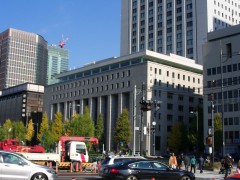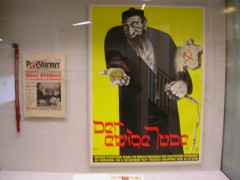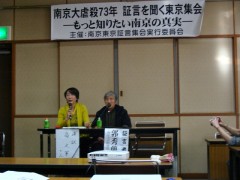07 December 2011
Book on US Occupation of Japan after WW2 "Washington Heights"
A book "Washington Heights" is written by a female journalist, AKIO Satoko. She studied how the United States government managed occupied Japan after the country defeated his enemy. Then she spotlighted on "Washington Heights," which was exclusive residential area for the U.S. military personnels located in the center of Tokyo. The area was built after the war was over by the order of U.S. occupational force. Before the war, it was Japanese imperial army's property. It was located next to Meiji Jingu Shrine, memorial shrine for the Meiji Emperor (crowned between 1868-1912) .
After the Olympic the place turned to famous public park, Yoyogi Park and Japan's public broadcasting station, NHK building.
The book mainly described episodes of Japan's Occupied era (1945-1952) and economic booming era until Tokyo Olympic in 1964. When the U.S. force arrived in Japan, they occupied many places in Tokyo for its administration purpose. The General Head Quarter was placed in Dai-ichi Life Insurance Building near the Imperial Palace.
But they needed housing for soldiers and staff working for the G.H.Q. So they ordered the Japanese government to build housing block for Americans, requiring facilities and equipment equivalent to American standard of that time. That was the hell of a big job for the Japanese government because the places were all burnt down, and shortage of goods.
The Washington Heights, American style housing provided Japanese new culture and lifestyle. Because American personnels and their family living there wanted entertainment, many Japanese entertainers were recruited for performances for them. That caused a big entertainment icon, Journey's Production, which has released many great talents to Japan's showbiz until now. Morie Hana, a famous Japanese fashion designer opened clothing shop for women living in the residential area. She studied most sophisticated western clothing during that time. As for food culture, Japanese learnt fresh vegetable farming to meet demands from Americans. Japanese learnt how to farm vegetable for the fresh salad taking sanitation into account.
As for how Americans thought about occupying Japan was described as well.
When Americans first arrived in Japan after the war, they were surprised because their former enemy citizens were so friendly to them. Many Japanese in fact, felt liberated when the war was over. So occupation worked more smoothly than expected. The U.S. occupation in fact provided democratization of Japan including women's suffrage, reform of biased wealth distribution towards elite class. The U.S. aim was to demilitalize Japan so they thought cracking down feudal customs and elite class power was best way to do.
The U.S. at that time were so worried about communist threat from Soviet Union. So they treated Japan nicely although Japan was a former enemy.
Most interesting episode noted in the book was that a former Japanese military officer met Afro-American man working as lower rank staff of G.H.Q. who told him that Blacks were glad when Japan attacked Pearl Harbor.
The conclusion of the book was U.S. occupation provided Japan great things but we have to remember Japan has been controlled by U.S. since that time and even after Japan recovered independence, we are always facing indirect occupation by the U.S. such as military bases in Okinawa, Tokyo, and diplomatic pressure to liberalize trade and commerce.
Recently the U.S. hegemony has been on the edge as you see "Lehman Shock" and "Occupy Wall Street" movement. The U.S. can no longer function as a role model for Japanese.
Thanks to the U.S. we could have developed the nation acquiring many great things from them but it is time we develop us ourselves in our own way.
22:01 Posted in Books, Culture, Tokyo Life, US-Japan relationship, USA issues | Permalink | Comments (0) | Tags: history, military
23 October 2011
True lesbian story "Юрико, до свидания."
The title is Russian but it is Japanese film about two Japanese women who had a sexual relationship in 1920's. It means "Yuriko, Good-bye!."
One of them is Yoshiko Yuasa, who was a translator for Russian literature. The other is Yuriko Nakajo, a novelist. They met in Tokyo and started to have sexual relationship and then travelled to Moscow together to study Russian.
Can you believe women in those days had relationship like today's gay couple? Indeed they did. They did it openly. Japan in those days was much more male chevinist society than today. Women did not have rights to vote. Women were expected to get married to men which their parents designated and work at home. But they could not resist passion they shared with each other.
The couple had 3 years of relationship and aparted. Yuriko later married a communist activist and then after the war, she became a leading figure of post-wolrd-war-2 democratic movement. She was actually a bi-sexual woman whereas Yoshiko was truly lesbian woman who had relationship with Geisha woman before she met Yuriko.
I went to see the movie on the first showing in Tokyo. The director, Sachi Hamano, and two actresses who played the couple appeared on the stage before the showing. The actresses were very pretty. Their act, especially lesbian sex scene was very fantastic and erotic.
There were viewers from foreign countries at the theatre. I don't know if they understood the language. I think they should be more curious than Japanese viewers were.
The film itself was great one although it did not describe their life in Moscow. The film was mainly about how they met and developed relationship before they went to Moscow.
I wonder if this film is shown in foreign country or translated version of it is produced.
Translated version should be like two western women met in London or Berlin and travelled to Moscow in 1920's or 1930's. Living together there in the cold Moscow. I recommend Nicole Kidman, or Jodie Foster to play the two.
The below is preview of the film (Only Japanese).
13:29 Posted in Film, Japan News, Society | Permalink | Comments (0) | Tags: literature, history, lesbian, feminism, women, homosexuality, russia
05 January 2011
America's Nazisation
I watched documentary program on America's new movement in relation to 10th anniversary of 911 attack. In New York, there is a big controversy over opening of new Islamic Center located 2 blocks away from Ground Zero. People overlap image of Al Quaida with Islam.
Anti-Islam activist, Pamela Geller was interviewed by a Japanese journalist. She said "It is not a matter of freedom of faith, it is a matter of emotion. Why should we figure them out? It should be defeated."
Sounds scary! After I watched the program on TV, I accessed her blog and emailed her the below question.
"Your response and comments sound like what Nazi people said to Jews.
Aren’t you using the same propaganda as Nazis did? Aren’t you creating another holocaust like Israel is doing on Palestineans?"
Her response as follows,
"The Jews weren't blowing people up, slaughtering thousands in countries across the world, and killing their own if not devout enough.
15 December 2010
Assange was arrested, next is me?
I guess not, but I did kind of similar thing to what he did. But much more minor scale.
An Australian whistle blower site manager, a former hacker was arrested for alleged sexual offense filed by Swedish police. Since US government information he leaked in collaboration with US military serviceman caused turmoil worldwide, this arrest is considered politically motivated. I think it is.
I secretly interviewed with US miliatary serviceman in order to get sensitive information of his organization.
If you are interested, please read the below article.
Interview with CVN 73 Nuclear Reactor Crew
What Mr. Assage has done is controversial, can it be part of free speech or promotion for transparency government, or threatening national security?
It is interesting to know there are people in the U.S., who support Assange. That is great thing about the U.S. Micheal Moore is one of them.
As Moore describes, what if some necessary information was open in public, we could have avoided tragedy or change the course of the country. History tells that is true.
Last Sunday I attended the speech event of Nanjing massacre survivor. The massacre was committed by former Japanese imperial army in former capital of China, Nanjing, December 1937. Her parents were shot to death by Japanese army men when her family evacuated to the air-raid shelter. They found the evacuees and shot bullets to them from the shelter entrance by machine gun. Later they poured gasoline into the shelter and burned the dead bodies in it.
Something like that has been happening on and on in recent Iraq and Afghanistan but has been never publicised until Wikileaks released.
"Leaking war crimes is not crime" is right!
21:13 Posted in Australia, Media, Politics, USA issues | Permalink | Comments (0) | Tags: military, history, war, china









